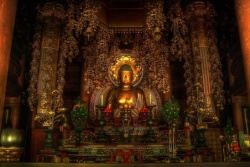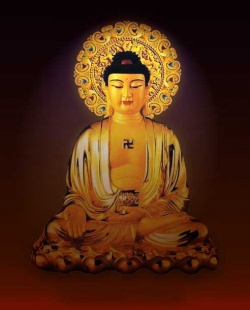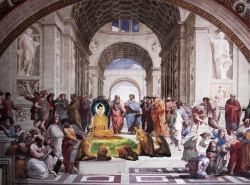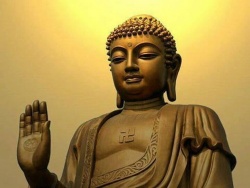Excerpts from ''Evolving One’s Mind''
Causation-The way of reaching completion of body, mind, and spirit
The content of the Preliminary Practices of Dzogchen (ultimate completion) is the basis for practicing each kind of Dharma method, which covers all doctrinal meanings of both Exotoric Buddhism and Esoteric Buddhism, and it also represents the essence of Mahayana Buddhism.
Pray for all sentient beings that have affinity with us, that they may have a guide for making wise decisions between good and evil when they encounter all kinds of tests in their lives – to guide the crucial elements of mankind 's behaviors that cause relative effects.
Preface—How to reach the other shore
It tends to be a diversified society now. There’s more frequent contact among people, however further and further distance separates us.
Many people try to fill our inner emptiness only with external things. However, very few can keep their mind calm and think about this question carefully:
“What is the real meaning and value of life?”
Foreword—Why must we study Preliminary Practices?
The 'Preliminary Practices of Dzogchen, which are the bridge for connecting the Exoteric and Esoteric Buddhism, represent all the essence of Mahayana Buddhism.
The content are in two parts—external and internal Preliminary Practices.
And it also contains all practices of Vipasyan?. The common practices for both Exoteric and Esoteric Buddhism are called “ External Preliminary Practices”, and the specific practices for Esoteric Buddhism are called “ Internal Preliminary Practices”.
Chapter 1:If we don’t save ourselves from suffering in this present life, when will we be saved?
'Precious Human Rebirth' -- People can transcend the birth and death only within the world of humans
What we already mentioned: ” To be reborn as a human being is precious and rare”, was preached to Terton Vidhyadhara Migyur Dorje by Avalokitesvara.
The main content is: If we are qualified with eighteen freedoms and endowments, we’ll have the chance to be liberated from samsara.
What is a blissful and perfectly satisfactory life?
Only as we experience the reality of this world, that all phenomena of this world are neither eternal nor invariable, will we lessen our desire and attachment, and thus have an easier and more comfortable life.
We come to know they are constantly changing and impermanent, along with a variety of causes and conditions. And they are not easily obtained as you might wish.
Chapter 2: Life is impermanent─How to work out an exit from the suffering of life
Impermanence should be the motive of practice
Nowadays, many people take career planning as a very important thing.?
However, no matter how compressive the plan we made, we can only have limited ability to plan our daily life.?
As for our future, we have hardly any control of it.?
When meeting our doom, what we struggled in our present life will disappear as smoke, at our death.
The key to liberation from sansara
Most of us are aware of good and evil, but these judgments are always influenced by our personal likes and dislikes, as well as our personal attachments.
Therefore, we can't have perfect judgment. The more eager we are to pursue happiness, the farther away it keeps. The more eager we are to escape suffering, the deeper we will be trapped.
Impermanence means we can’t mark an expiration date for life
By the observation of impermanence, we learn from departure in life or death, and from the entanglement of love and hatred, to see clearly the phenomena of causes and conditions, which are arising and ceasing.
And we must be alert to the realization that life is as short and fragile as breathing. Only when we cast off the attachment of self, can we arouse the will for detachment from secular life and go toward the path of liberation of life and death.
Impermanence is the motivational force of practice
Our mind is like an untamed wild elephant that can’t be controlled. That’s why we continuously commit evil, due to our attachment, ignorance and delusion. Hence, we are controlled by the force of karma, of cause and effect, life after life, and are continuously reborn in the six realms of living forms.
Chapter 3 :Cause and effect is a fact
The destination and karma result in samsara
Where do sentient beings come from and where are they going to after death? How does samsara function in our world? We believe these are the phenomena that many people want to explore.
With the Buddhist concept of cause and effect, we may understand the source of birth and death in samsara, which results from the karma we made for ourselves.
And according to this karmic force, it is determined where we should be reborn and what kind of karma result we will attain.
The karma results caused by ten evil karmas
Due to the concept that cause and effect is a fact, we know all karma results, both good and bad, are determined by our old karmas, if we had done ten evil karmas in our past lives, we would get various sufferings and afflictions in this present life.
However, while suffering from the results of our previous evil deeds, we continue committing more evil karmas at the same time, we will get worse and worse results in our next life.
Also we will probably fall into the three evil destinies and never be able to get released from the suffering of samsara.
How to cultivate our mind in daily life
Sentient beings transmigrate within the six realms of samsara, regardless of the particular karmic location of their birth, the essence of samsara being painfulness of existence.
Just like caged bees in a glass bottle, no matter how hard they struggle to fly out, they are always bound to finally fail in their efforts.





